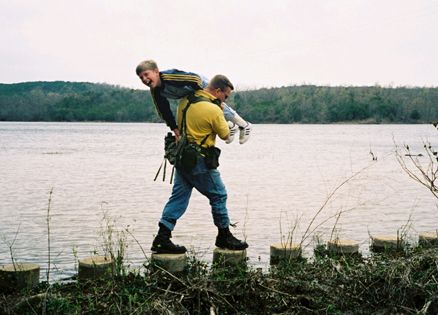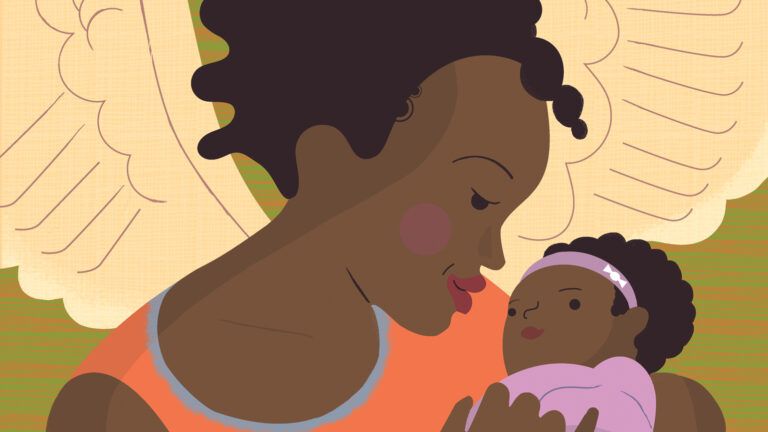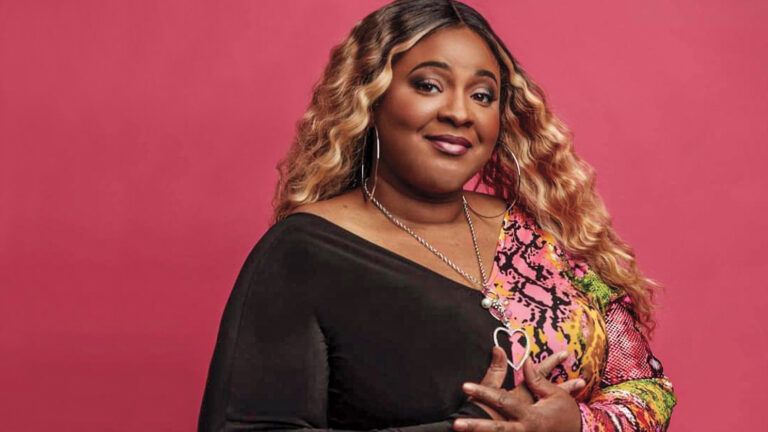I’d been on plenty of marches in my time as a Marine, but never anything like this. My platoon today was undisciplined, stopping to kick at twigs, talking and laughing as we hiked through the woods, no one paying attention to the sound of rushing water ahead.
Then again, I expected that from a bunch of 10-year-olds.
I was about as far from the battlefield as I could get, accompanying my son, Patrick, and his fifth-grade class on a three-day field trip at Camp Classen in the Arbuckle Mountains of southern Oklahoma.
I looked down at Patrick, sitting in the three-wheel jogger I pushed in front of me. My son has cerebral palsy and 10 years ago doctors didn’t think someone with his brain damage would live, much less be hitting the trail with his classmates.
Before Patrick, the biggest challenge I had was achieving my dream: becoming a Marine officer. My dad was a Navy man, and I knew I wanted to serve in the military. In college at The Citadel, I chose the Marines. To me there was no greater honor than leading the most elite fighting force on earth.
First, I had to go through officer candidate school—two six-week courses of the most grueling physical and mental tests I’d ever faced, including the Confidence Course, a race through 11 obstacles with names like “Slide for Life” and “Jacob’s Ladder.”
I scaled tall barriers and swung from monkey bars high above the ground. Our commanders urged us on. Nothing was beyond our capabilities, they said.
In 10 years I rose through the ranks, becoming company commander. I served in Operation Desert Storm, then led my men in Somalia. Our mission was humanitarian: get food to starving people, rebuild roads and disarm the warring local factions.
But we came under fire. When times got tough, I prayed. God always saw me through. At the end of my six-month deployment cycle, I returned home to Camp Pendleton in California. I’d have six months to spend with my wife, Nancy, just in time for the birth of our first child.
Nancy was a Marine too. We planned to alternate deployments so we could raise our child and maintain our military commitments. I was convinced that being a career Marine—a lifer—wasn’t just my plan but God’s plan too.
My knees buckled when I saw our son, Patrick, for the first time. I was love-struck. I tore myself away from the hospital around midnight two days after his birth to get some rest.
The ringing phone jarred me awake at 4:00 a.m. Patrick was sick. Meningitis. I rushed to the hospital. He’d gone into septic shock.
“We’re taking him to the NICU in San Diego,” the doctor said. “He may not have long.”
The Camp Pendleton community rallied around us. The base chaplain baptized Patrick. I prayed, harder than I had even under fire in Somalia. Patrick clung to life like a little warrior and after a month in the hospital, he was discharged.
The doctors couldn’t give us a solid prognosis, but a sonogram showed anomalies. His motor skills and learning ability could be impaired, perhaps severely. We’d have to closely observe his behavior.
At the base daycare center, we noticed differences. Other babies moved more, rolling over and lifting their heads. Patrick was often still, and couldn’t keep his head up. Nancy set him in an Exersaucer and needed to put a pillow in to keep him upright.
After five months, it was clear Patrick lagged behind his peers. I put my finger in his right hand and he gripped it tight, but when I tried his left, Patrick’s hand and arm hung limp. Nancy read up on the symptoms. Everything pointed to cerebral palsy.
One afternoon I tucked Patrick in his crib for a nap. I went to the window to lower the blinds. Outside, a group of Marines ran by in tight formation, getting ready for deployment. My time home was almost over, and the process had begun for my promotion to Major, which would bring new responsibilities.
It was my dream…but it wasn’t possible anymore. Nancy was medically discharged after suffering a mild stroke after Patrick’s birth, and she couldn’t care for him alone. I have to quit too, I thought.
I turned back toward Patrick. He looked peaceful, already asleep. I was terrified. Get it together, Marine. After Iraq, Somalia, how could this shake me? But war I knew. Raising a son with disabilities? I hope you have a plan, Lord, because I sure don’t.
We left Camp Pendleton and Nancy and I found jobs in Texas, where her family is located. We worked opposite shifts so one of us could be there for Patrick.
We settled into a routine. Nancy put Patrick to bed at a sitter’s house and went to her night-shift job at a snack food company while I got some rack time. I’d pick Patrick up in the morning, get him dressed and spend the day with him.
I tucked Patrick in his crib for his afternoon nap and went to my second-shift job managing the processing line at a hot dog plant. Nancy had the evening shift. Our time with him was exhausting. I needed to hold him the whole time he played, retrieve every toy he wanted.
Other kids display some independence after a year, but Patrick couldn’t do anything by himself. One night, before I dropped off in an exhausted sleep, I turned on the news and saw a report of Marines being deployed.
That could have been me. I missed the camaraderie, the 170 men in my unit, all looking to me for answers. My life was all about Patrick now, and I didn’t have any answers.
Our neurologist finally diagnosed Patrick with cerebral palsy, and entered him in early intervention therapy. Physical, occupational and speech therapists came to our house. The stretching and balance exercises reminded me of the training I’d gone through at Marine OCS—for Patrick, they were just as grueling.
The occupational therapist put a hairbrush in 14-month-old Patrick’s hand, and I expected him just to hold it. Instead, he started brushing Nancy’s hair!
Patrick started speaking little by little. And after three years of intensive physical therapy, I watched him take his first, slow, unsteady steps with the aid of a walker. He’d still need a wheelchair for longer distances, but…he’s standing on his own!
We had two daughters, Katie and Nicole. We didn’t hold back on family activities for Patrick. He loved our trips to the lake, where he’d sit in a tube while I towed him in our boat. He sang along with the girls to any song on the radio.
When Patrick was six, we found a program that allowed him to be mainstreamed into some classes and activities. One day I took Patrick with me to the supermarket. In the checkout line, I saw a little girl, standing with her mom, staring at him.
“Why are you in a wheelchair?” the girl blurted. The mom’s face turned red. “I’m so sorry,” she said.
“It’s all right,” I said. Patrick needed to learn to deal with situations like this. “Let him answer.”
Patrick did…but he didn’t stop there. “You want a ride?” he said. The two of them spun around the checkout area, laughing and squealing. If I were still in the Corps, I would have missed this.
Then Patrick reached fifth grade. “Guess what?” he said after school one day. “I’m going to be in the talent show!” He was still behind his peers academically and he needed a walker for balance if he was on his feet for long. Had I given him too much confidence? I didn’t want to set him up for failure.
I thought about a song Patrick and I loved to sing together: “The Greatest” by Kenny Rogers, about a boy who dreams of being a baseball player. The song’s message was perfect for Patrick: Be proud of what you can do. Could he sing it?
Every day after school I played the song and helped Patrick memorize the words. Nancy and I rehearsed his routine with him. The day of the show, he wheeled to center stage wearing a baseball cap, carrying a bat and ball.
While he sang, he threw a ball in the air with his right hand, his bat across his lap. I waited for the end of the song, anxious. Patrick beamed and sang the last verse in a full, loud voice, “I am the greatest, that’s a fact, but even I didn’t know I could pitch like that!” The auditorium erupted.
Patrick came offstage and into my arms. I hugged him tight. I may not have been leading 170 men anymore…but I was leading the one who mattered most to me. He’d come to me for an answer, and he paid me back with love. That was better than any “Sir, yes, sir.”
Now, on the trail at Camp Classen, I ruffled Patrick’s hair. We emerged from the woods and reached the water. I stopped cold. We were at a dam holding back a lake. A rush of water fell six feet to the river below.
The only way across was a row of round cement pillars spaced out along the edge of the falls. No way could I wheel Patrick across. “We didn’t know there wasn’t a bridge,” his teacher apologized.
I stared again at the pillars. They reminded me of something I’d seen a long time ago. The Confidence Course. “No one stays behind!” I yelled. I hoisted Patrick onto my back. “Hold still,” I said, stepping onto the first pillar.
Halfway across, he started laughing. His laughter echoed across the lake, a sweeter sound than I could ever have imagined. Maybe God did have a plan for me all along. The Marines were just a part of it, training for the most important duty of my life: being Patrick’s father.




